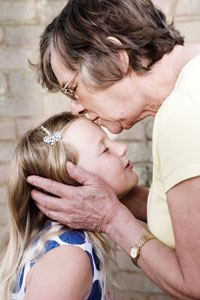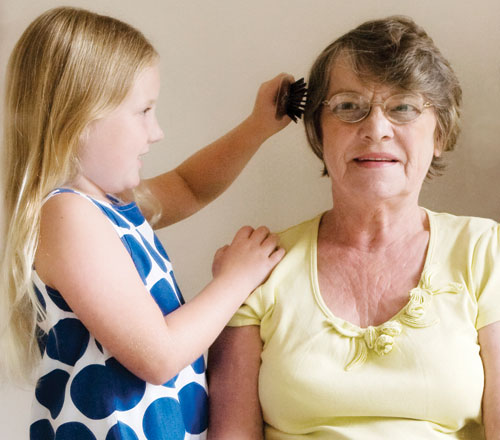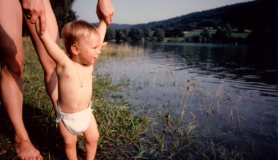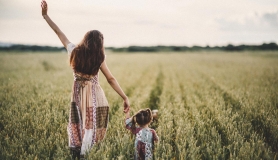We currently live in a society obsessed with youth and beauty at all costs and yet at the same time we are living longer than ever before. The Office for National Statistics (ONS) recently announced that there are more pensioners than children living in the UK today. Pensioners constitute nearly 20% of the population, and are increasing. Our children’s generation is set to live far longer than our grandparents’ generation did. So we need to think very carefully about the message we are sending out to them about ageing.
Traditions and respect
In traditional cultures, the elderly were a valued and important part of the family and society as a whole. Indeed, in pre-Christian England, pagans celebrated all stages of life as part of Nature’s divine cycles. The power of women was acknowledged through her Maiden, Mother and Crone stages, with the final, Crone aspect, eliciting the most respect. Elder men were respected as the Wise Sage.
“Their knowledge and the wisdom accrued through years of living is respected by the community.”
Cultural aspects
In many places around the world today, grandparents remain living in the family home, taken care of in the same way they took care of their own children. They are seen not as a burden, rather their knowledge and the wisdom accrued through years of living is respected by the community. In the western world, we have nursing homes in which ageing can take place out of sight. The decline and degeneration of the body – the winter of our life cycle – is hidden away in designated places. The older generation rarely graces the big screen with their presence except in caricature roles which further serve to alienate them from society. They pop up in the media in adverts for hearing aids or sanitary protection. We have few role models for growing old with zest and pleasure – it seems we can’t help but take pity upon the elderly, robbing them of the strength and power they should be inheriting. Our society’s wise elders are mocked in sit-coms, pigeon-holed as boring, slow, belligerent, helpless, pathetic and a drain on public resources.
Change the definition
We don’t want our children to inherit this kind of attitude so it’s important now to make changes in how we define age. If you stand in front of the mirror bemoaning your wrinkly forehead or saggy jowls, stop! You’ve been sucked in to believing that your worth is defined by how ‘beautiful’ and youthful you appear! And those little people in the bathtub behind you are absorbing the message…
Appreciate nature Part of celebrating the process of ageing is seeing it as a natural, beautiful part of the cycles of nature. Get outside with the kids and witness the cycles of life. Everything that is born goes on to grow and mature to adulthood, and then declines and eventually dies. This is normal and natural – remembering our place in the cycles of nature reminds us of the blessing of life.

CELEBRATING THE CYCLES OF LIFE
EMBRACE YOUR CRONE ASPECT Celebrate your own coming of age. Rather than lie about your age, shout it from the rooftops – you’re older and wiser! If every woman was proud of her age this would create a sea change of positivity for our daughters.
HAVE A MENOPAUSE PARTY Invite your friends and ask them each to bring a small gift (such as a thought, a picture, a book, a herbal remedy etc.) that either helped them on their own personal journey or that they think would be supportive to you.
OPEN YOUR MIND AND HEART Indulge yourself with some daily affirmations –when you’re tempted to say ‘I look so old/ wrinkly/saggy’ in front of the mirror, try ‘I’m a beautiful, wise woman growing into her full power’ instead.
REWRITE THE FAIRY TALES Rewrite some of the old favourites with your kids, giving the older characters qualities such as wisdom, respect and magical knowledge. Replace the nasty witch with an exciting elder.
CHECK YOUR LANGUAGE Refrain from using derogatory language about ageing with your kids, family, friends and most importantly, yourself. Introduce words like ‘wise woman, elder, powerful, strong’.
THINK ABOUT THE MESSAGE Our children are bombarded with messages from the media saying ageing is bad and must be fought with lotions, potions, drugs and surgery. You need to counterbalance that. Discuss the processes of ageing openly; why and what happens. Look out for examples in the natural world that help kids understand the cycles of life.
START AN ‘ELDERS’ PROJECT Get to know the elders in your community. Invite them to share stories of their own childhoods. You could make a ‘This is Your Life’ photo book, write stories and thoughts, or make video or taped recordings. These will all serve as valuable memory tools when the older generation has passed away.
CONSIDER HELPING OUT An afternoon spent with an elderly neighbour can make a vast difference to their day, as can small acts of kindness like picking up groceries when you’re out. If you are caring for someone with dementia, read the inspiring ‘Contented Dementia’ by psychologist Oliver James for a person-centred approach.
ADDRESS YOUR OWN FEELINGS If you feel like you’re fighting a constant battle with yourself about ageing, let it go. Be kind to yourself; look after your body and your health. How you look externally is a reflection of your inner health – physical, emotional and spiritual. Nurture your body with health-giving foods, drink plenty of water and fresh juices and keep your skin nourished with the minimum of natural products. People who eat a diet rich in raw, living food tend to radiate a glow from within, as do those who are content and happy with their lot in life. Remember your body’s just a shell for the soul making a spiritual journey on Earth. And one more thing, grey hair is beautiful – don’t cover it up.
CELEBRATE AGEING Think about the things you can do in the future that you can’t do now. Make a list of all the amazing things you plan to do when you retire. Most people agree they care less what people think as they reach retirement and are thus more willing to embrace life. Write a book, spend time with your grandchildren, build an eco-house, start an organic farm…see age in terms of opportunities. A positive list secreted somewhere reminds us to see age as a blessing rather than a curse.
SEE THE BEAUTY IN OLD AGE Make a scrapbook of wise, older people with your kids. Discuss what’s special and unique about the older form and faces. Look for pictures of indigenous tribes-people wearing their ageing bodies with pride, old people who don’t hide their bodies in embarrassment under layers of clothes. Look for pictures that reflect dignity and pride. Each wrinkle on the face, each crease on the body tells a story. Collect together photos, pictures and postcards of elders and think about the beauty in a life well lived. With older kids, this is a good opportunity to open up a discussion on homogenised beauty in the media.
Many thanks to Annie Armitage for the photographs.







